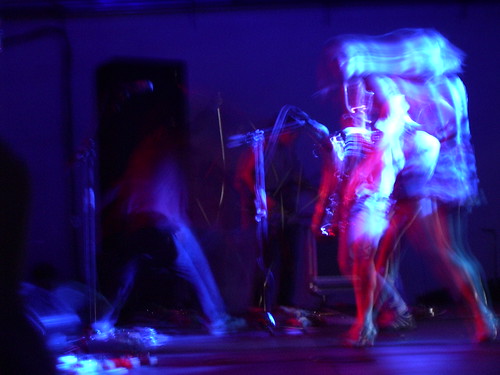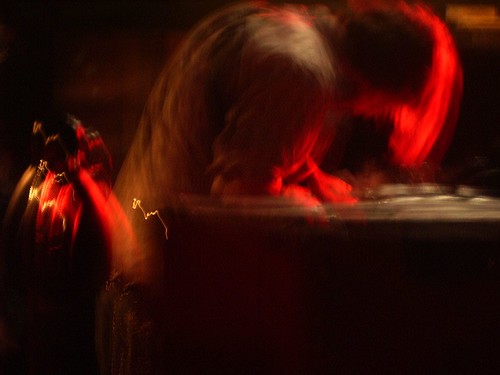


Rio
The next day, Thursday 2nd June, is mostly occupied by the long flight from Manaus to Rio, where we read up on the press reports of the previous night’s events. The Brazilian press jocularly receives gig’s riotous conclusion with good humour: “The White Stripes rock Manaus!” reads one headline; “The White Stripes’ Delicious Irresponsibility!” teases another. The only downside is the publication of photographs shot without the band’s approval, by a mysterious photographer, of Jack and Karen handling the Caiman during our trip along the Amazon. It seems the paparazzi can even intrude upon the solitude of the rainforest.
By midnight, only Meg and some of the road crew are still standing at the hotel bar, exhaustion taking most to an early bed.
“We’re going over to the beach to get Meg some fresh Coconut juice,” says John Baker, even though we’ve been expressly warned against visiting the beach after dark, due to the local violent crime. There’s something about John Baker that inspires a feeling of safety; that something isn’t, however, the butter knife he slips down his underpants on the way out, for self-defence. It isn’t required, however, as our mission to secure Meg a freshly-chopped green coconut and drinking straw is threatened only by the profound language gap between ourselves and the guys selling the fruit on the beaches, to the assorted hookers, tough looking guys straight out of City Of God, and the few tourists fool enough to traipse by. But getting what the Stripes want, against all odds, is Baker’s mission in life these days.
New Zealand-born Baker first heard the Stripes back in 1999, at a Donnas aftershow party in Australia. However, the Stripes’ music had been taped over another band’s cassette, so he was clueless as to their identity; a little detective work revealed the band’s contact deals, and soon Baker - whose other rock’n’roll pursuits include helping great young Antipodean bands like Mint Chicks, and releasing limited-edition seven inches for the Dirtbombs - was offering Jack a series of shows in Australia. The White Stripes toured down under over a year before setting foot in the UK, though Jack didn’t believe the proposition was genuine until John mailed him the airline tickets for New Zealand.
Like most of the Stripes’ touring crew, Baker has been a part of the band’s ‘family’ since before the ‘madness’ set in, and it’s this closeness, this familial security they encourage with their entourage, that ensures they’re able to operate so efficiently, with such a bare support crew. It’s just another way of keeping touch with ‘reality’, holding everything together. Jack, it appears, is old-fashioned enough to know it’s your family you run to, when everything goes wrong
“I felt kind of lost, I didn’t feel I had anyone to talk to,” he remembers, of his darkest moments at the start of the year. “So I started focusing on my family, the people who gave out love and positivity.”
The very cathartic process of recording Get Behind Me Satan signalled the beginning of his ‘rebirth’. “The ceiling was leaking, the equipment broken, we’d wait days on end for stuff to get fixed,” sighs Meg, eyes turned up to the ceiling, listing some of the maladies plaguing sessions Jack himself describes as “Bizarrely cursed”.
“Just the weirdest stuff started to go wrong,” he continues. “When we were recording ‘White Moon’, Meg’s rack of bells fell over; you can hear it in the background on the album. Nothing was working, everything was broken. And then we wrote and recorded ‘Blue Orchid’, and everything fell together. The riff was so simple, so effective, it cemented the album together. It really rescued our mentality at the time, too, because we were about ready to jack it all in.
“Recording this album relieved so much from me,” Jack adds. “A lot of stuff was filling up my spiritual knapsack, you know? A lot of hopelessness, a lot of ideas that weren’t coming together. It felt good to get those songs, which had been hanging around for a while, on tape and out there. To clear the air, so we could just go out and play.”
Recorded under pressure and flung out to the people less than three months after recording finished, Get Behind Me Satan is The White Stripes’ darkest, heaviest, oddest set yet, paradoxically leavened with some of their most gloriously ‘pop’ moments to date. Like the insanely addictive ‘My Doorbell’, which boils the essence of Led Zeppelin II down to three minutes of bouncy soul-pop with nary a guitar attached, or the vulnerable, dignified balladry of ‘Forever For Her Is Over For Me’. It’s the more unhinged songs that dominate, however: ‘Red Rain’, a monstrous Zeppelin of bloodied blues and swan-diving riffs, revisiting the same slide-scorched landscapes as ‘In My Time Of Dying’; or ‘The Nurse’, a ballad of obsession and betrayal, regularly torn apart by blasts of distortion; or ‘Take, Take, Take’, an epic musing on fame as seen through a rabid Rita Hayworth fan’s eyes.
“That whole album comes from what a lost cause it seems, to fight for truth,” explains Jack. “I had a few weeks there where I didn’t care about the truth at all. And then, one day, uh… I don’t want this to come out wrong, but a miracle happened to me. There was a dictionary on the table, and I picked it up, and at the top of the page I opened was the word ‘truth’.”
“We experience synchronicity a lot,” urges Meg, as if in defence of Jack’s miraculous story. She has a knack of often grounding his wilder theorising. “When coincidences occur, it’s for a reason. That’s happened throughout the whole course of the band. When it happens, you know you’re on the right path to something. When it’s not happening, I worry that something might be wrong.”
The ‘Truth’ is, White admits, one of his ‘obsessions’. “My favourite thing about human behaviour is when it doesn’t revolve around the truth,” he says, slyly. “When people lie to themselves, or are in denial. The ‘truth’ is probably a complex of mine. Irony is so prevalent in our culture now, it’s the easy way out, the easy metaphor. Like, I heard the new System Of A Down single, ‘BYOB’, the other day, and I just assumed its chorus, “Everyone’s going to the party, gonna have a real good time”, was ‘ironic’. Because it seems its all anyone can think of nowadays. I would’ve been more impressed if they’d actually meant it, you know? “Gonna have a real good time!” Yeah! That would be more ‘punk-rock’, to me, to be sincere, rather than ironic.
“Looking back now, on songs that I’ve written, the motivation was always, Why do we do the things we do? What’s the purpose behind them? When it comes to writing about human behaviour, that’s the first thing that pops in to my head: look at what you’re doing. That’s my whole mentality: well, look at what you’re doing. Isn’t that interesting? You could probably rename every one of my songs, ‘Well, isn’t that interesting?’ [laughs]”
Was it your obsession with the ‘truth’ that drew you to the blues?
“Oh, definitely. If you turned on some Charley Patton right now, forget about it man, I’m not leaving the room. I love that so much, it just gets to me. It’s so heavy duty, and it’s so truthful. We romanticise that time period, because we don’t know anything about it - there’s just one photograph of Charley Patton, and he must’ve led a bizarre and romantic life. Of course, he was also a womaniser and a wife-beater, a drunk. But when you really start to dig into what’s going on, the dichotomy of his love for evil and his love for good, and you see the struggle in someone like that. How beautiful is that struggle? Any story is of course about struggle, and the blues gives it to you, in spades…”
Is it a risk, to be sincere?
“Certainly. Because people don’t buy it, you know? I’ve always said, the whole ‘brother/sister’, red-white-and-black aesthetic of the band ensures that anyone who would be put off by these things, who would consider them ‘gimmicks’, wouldn’t buy our records. And I say, good. Because we don’t want to be friends with you, if you aren’t interested in digging beneath the surface.”
The truth is, of course, that for all Jack White’s obsession with the ‘truth’, The White Stripes are a fake, a sham, a big lie. Painted in red, black and white, like a cheaply-printed comic strip, almost everything about them is a fabrication. ‘Jack White’ was born John Gillis, and his ‘sister’ Meg is actually his ex-wife, wedded before the band formed, and divorced before their second album was recorded. This isn’t denied rumour, as it was when the Stripes first hit the UK, back in 2001, but rather fact, backed up with documentary evidence, such as their divorce certificate, available on the internet.
Given this knowledge, almost every aspect of the Stripes’ phenomena gains an extra intrigue - not least the fact that it was Jack’s ex-wife, not his ‘sister’, who urged him to so speedily marry his new girlfriend. The frustration is, of course, that in interview it’s impossible to breach such subjects. The fictional creation that is ‘Jack White’ would disappear in a puff of logic were he ever to acknowledge the existence of John Gillis. Slyly acknowledging that the Stripes’ brother/sister angle might be a fiction is as close as we’ll get to a peek behind this Lone Ranger’s mask, even then accompanied by a gentle chiding for focussing on such trivia.
But it’s Friday night, June 3rd, and the White Stripes are playing Clara Hall, a cold and artificial venue tucked inside a shopping mall in Rio De Janeiro. Before the show, the band were ragged with the head colds that have dogged the tour, Jack’s voice shot, their energies sapped. Also, this afternoon, Karen had to leave for a modelling assignment. Expectations for what we’ll witness tonight are therefore unusually low, and certainly no-one expects a show to rival what we saw in Manaus.
Still, they are magical. Swaggering and seemingly recovered, Jack takes the microphone and sermonizes to his audience, dazed, reefer-smoking Rio teens, electrified by one of the few rock’n’roll bands to play this city. “I tore a page out of the book of cool,” he leers, before delivering the punch line, “It’s a boring book.” Soon, the duo are tearing through a feral set of mostly oldies, mostly crowd-pleasers (“I played ‘My Doorbell’ and just felt all the energy sucked out of the room,” he scowls afterwards, “So we didn’t play any more new songs.”), the kids a sweaty, writhing pit, spectacle-wearing indie boys held aloft by their friends, until the security wade in and they scatter.
The magic and momentum, the sense of danger and occasion of the Manaus show might be absent, but even in such impersonal surroundings, they curate such a sense of communal suspended-belief. It’s akin to churchful of the faithful, every soul in the room implicitly accepting Jack and Meg to be the brother’n’sister troubadours they present themselves as, even in the face of scientific evidence to the contrary. Or perhaps that Lone Ranger metaphor applies here, too. Because, if you somehow discovered the Lone Ranger’s ‘true’ identity, would you really reveal this secret, and bring the legend of the Lone Ranger to a premature end?




2 comments:
Hi Steve, are you still in touch with John Baker? I wanted to contact him about a couple of CD projects we talkd about years ago! If so, my e-mail address is:
john.greedo@ntlworld.com.
Thanks!
Hey Steve, I'm trying to contact John Baker about some CD projects we talked about years ago. My name's John Reed - he should remember me. My e-mail is: john.greedo@ntlworld.com. If you're still in touch with him, could you forward this?
Post a Comment